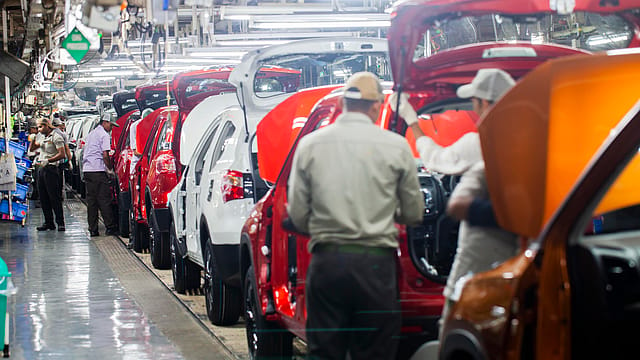Historic November for auto sales in India: FADA
ADVERTISEMENT

Auto retail sales created history in November with 28.54 lakh vehicles getting sold, surpassing the previous high of 25.69 lakh units in March 2020 when automakers transitioned from BS-4 to BS-6 emission norms, according to the Federation of Automobile Dealers Associations (FADA).
"November'23 has become a historic month for the Indian Auto Retail Industry as during the month, 28.54 lakh vehicles were sold, thus overtaking the previous highs of March'20 when the industry sold 25.69 lakh vehicles during the BS-4 to BS-6 transition," says FADA president Manish Raj Singhania.
Passenger vehicles and two-wheelers witnessed record-breaking performance. PV sales rose 17.19% year-on-year to cross the 3.6 lakh mark in November, overtaking sales of 3.57 lakh cars achieved in October 2022.
"November 2023 witnessed a strong surge in the PV category, primarily fuelled by Deepawali and the launch of new and appealing models. The improved supply chains, coupled with new launches, effectively catered to the festive demand, marking the peak point in sales," says the FADA president.
Singhania, however, says the period following the festivities saw a noticeable slowdown, coupled with a critical challenge of slow-moving inventory due to a mismatch in demand and supply which is still not resolved. "This issue casts a shadow over the otherwise positive trends, highlighting the need for strategic adjustments in inventory management," he cautions.
PV inventory has slightly reduced but continues to remain above 60 days. FADA urges carmakers to cut back on dispatches of slow-moving vehicles in the entry-level category and to announce attractive schemes that will support year-end buying and help reduce inventory at dealerships.
Sales of two-wheelers jumped 21.08% year-on-year in November to 22.47 lakh units. "For the 2W category, the month witnessed a significant boost in auto retail, thus making it clock all-time high retails, buoyed by the festive excitement of Deepawali and enhanced by strong rural sentiments, thanks to thriving agricultural income. New product launches and better model supply further fuelled the market's growth, while electric vehicle sales demonstrated an encouraging upward trajectory," says Singhania.
While overall auto retail sales grew 18%, tractor and commercial vehicle (CV) sales declined 21% and 2%, respectively. "The CV category saw a challenging Nov’23, driven by poor market sentiment. Seasonal slumps, exacerbated by unseasonal rains damaging crops and impacting transport demand, coupled with liquidity issues and delayed deliveries, further strained the industry. States going into elections also added to the woes, overshadowing the brief uplift from festive sales and the slight increase in tourism that helped in sales of buses," says Singhania.
Severe rains and hailstorms in west and south India are expected to dampen rabi cultivation, which is already experiencing slow sowing and low reservoir levels, potentially impacting the final crop output, the auto dealers' lobby warns. This may also lead to increased inflation, making daily essentials more expensive and thus affecting vehicle sales in the near term, it cautions.